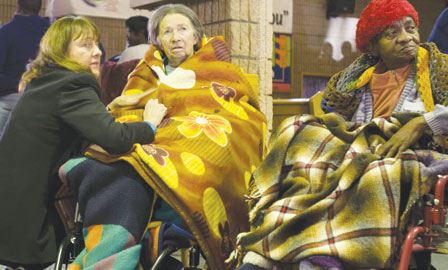|
Caring for the Elderly
By Walter Mswazie, The Southern
Times
April 2, 2012
Zimbabwe

The continued
break down of the social fabric through the demise
of the extended family system and values due to
socio-economic malaise, among other factors, has
gone beyond imaginable magnitudes.
This has seen the elderly being hard hit since
many people have abandoned their social
responsibilities to look after the now
economically inactive populace.
There are many reasons behind families’ failures
to carter for the welfare of the aged.
Chief among them is the economic decline being
experienced in many parts of the world, which has
seen more families surviving from hand-to-mouth.
In many cases, income levels have hit rock bottom.
The economically active generation can no longer
sustain the extended family and thus leave the
welfare of the elderly unattended.
With the meagre incomes that many working people
earn, it has become difficult for many families to
save, let alone take care of other members outside
the nuclear family.
The will may be there but the resources are
proving to be too little.
Most people have benefited from the extended
family in one way or the other and a few, if any,
would want to be dissociated from their kith and
kin but economic inadequacies can sometimes make
one behave otherwise.
There are other social factors behind the decline
in importance of the extended family.
In many cases bad blood has resulted in family
members not seeing eye-to-eye and vowing never to
communicate or assist each other.
It is not unheard of to find family members
accusing each other of witchcraft and thus not
eager to be around one another.
The belief in witchcraft is quite ingrained in
many African societies, and elderly people have
been maimed or even killed after being accused of
causing the death of family members.
This has seen elderly people abandoned to fend for
themselves, with many of them reduced to beggars.
In other cases, neglect of the elderly is due to
migrations to the Diaspora or the impact of HIV
and AIDS.
The young and sexually active are the most
vulnerable to the pandemic and when they die, they
sometimes leave behind children that are taken
into the homes of elderly people, who are not
economically active.
This, says sociologist Professor Claude Mararike,
requires families to plan better for their old
age.
“Workers should learn to save for their future so
that they will be able to lead a normal life when
they are old.
“I know that things are hard for most people but
it is prudent for every person to try by all means
to live within their means and save from the
little income they are earning,” he advises.
Tendai Garwi, who works for HelpAge in Zimbabwe,
laments the neglect of the elderly by society and
governments.
“It is disheartening to note the extent to which
elderly people are neglected. Families are no
longer taking care of their old, citing various
reasons.”
She says old people’s homes are largely
underfunded and the elderly often find themselves
having to work hard in their twilight years to
keep body and spirit together.
Historically, old people’s homes have survived on
money from the relatives of the people staying
there and donations from philanthropists.
In some cases, a small government grant is
available.
But that kind of money is no longer flowing in as
much as it used to and old people’s homes are
struggling just as much as orphanages are.
An official in Zimbabwe’s Department of Social
Services says old people can collect grants from
the institution, but these are low.
“Old people in Zimbabwe are taken care of by the
social grants but the challenge is that the same
grant is used to support all vulnerable groups
that include the disabled and orphans,” says the
official, who asked not to be named for
professional reasons.
There is not much most governments can do at
present by way of improving the lot of the
elderly, as other development challenges constrain
them.
This means the onus largely lies on families and
communities to take responsibility for the
elderly.
Zimbabwe’s government has come up with an Old
People’s Bill that is due to be tabled for debate
this year.
The Bill seeks to improve the social grants
awarded to the elderly among other initiatives
that cater for their welfare.
However, there are fears that the Bill has taken
too long to be tabled, apparently indicating that
the matter is not being treated as seriously as
other issues that are before the legislature.
At present, the country’s Treasury is battling to
raise money for civil servants’ salaries, and from
a politician’s and development expert’s point of
view, public employees are a priority for resource
allocation.
The danger of this is that the Bill could gather
dust for many more months, or even years, though
alternatively the President can invoke his
executive authority and legalise it as a Statutory
Instrument.
However, the need to attend to old people’s
welfare can never be over-emphasised.
How we treat the aged and vulnerable and what
premium we place on their welfare, says something
about our values as societies.
It is thus every a family’s responsibility to take
care of the needs of its elderly members.
Copyright
© Global Action on Aging
Terms
of Use | Privacy
Policy | Contact Us
|



